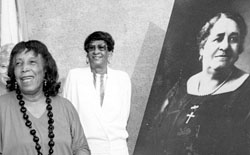During the 1950s and sixties, there was an increasing concern among African Americans with preserving their heritage that emerged as a concomitant of the Civil Rights Movement. Similarly with the subsequent Women’s Rights Movement of the 1960s and seventies, came an emphasis on recording and preserving women’s history and heritage. It was in this climate of concern about recapturing and recording unsung African Americans and women that in 1974, Mrs. Mozelle Baxter, of Richmond, Virginia called together a few Black women to talk about her discovery that the Maggie Walker house was up for sale. Her action as a concerned citizen led to a broader movement that involved the Richmond, Virginia chapter of the Association for the Study of African American Life and History (ASAALH), Richmond municipal government and other formal heritage preservationists collaborating to get Walker’s home nominated by the Virginia Historic Landmarks Commission (VHLC) in 1975 to the National Register of Historic Places (Baxter 1979; Dance 1999, 2000).
The women formalized their entry into heritage preservation activities when they incorporated as the Maggie L. Walker Historical Foundation (MLWHF) in 1975 (Commonwealth of Virginia, 1975).
The Foundation broadened their goals to include the preservation of Jackson Ward the neighborhood surrounding Walker’s residence(Dance 1986; Dance Personal Communication 1999, 2000). The Foundation in collaboration with the Landmarks Commission, sought a grant from funds administered by the National Park Service under the National Historic Preservation Act to renovate Walker’s home (Green, 1975).
As the bicentennial year unfolded the Jackson Ward neighborhood was nominated to the National Register of Historic Places (1976). The Foundation continued to engage in both informal and formal heritage preservation activism until in July 15, 1978 Congress enacted Public Law 95-625 authorizing the Secretary of the Interior to establish the Maggie L. Walker National Historic Site—the first National Park site to honor an African American woman.


